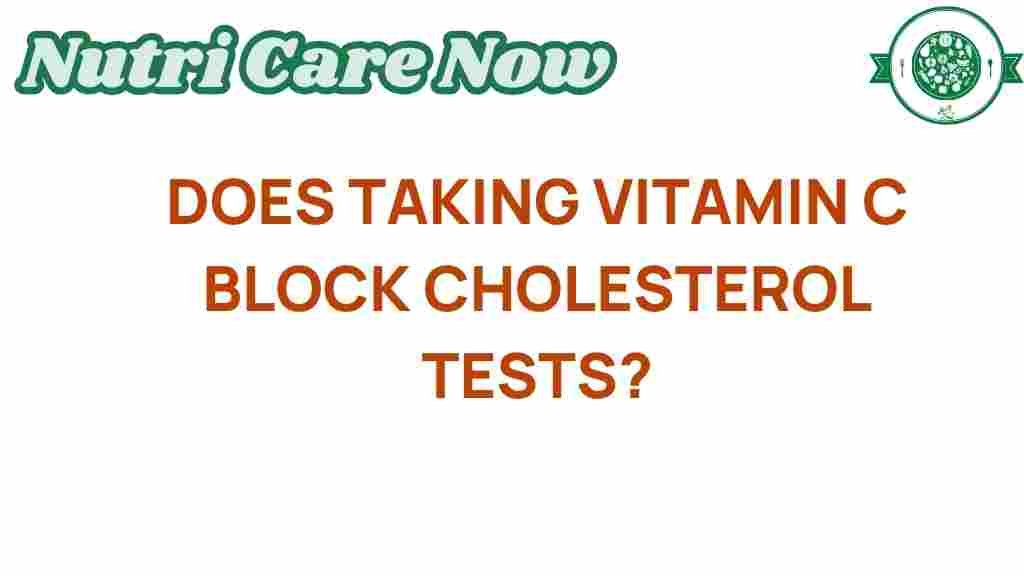Unveiling the Truth: Does Vitamin C Influence Cholesterol Tests?
When it comes to maintaining optimal health, the relationship between vitamin C and various health parameters is of great interest. One area that has garnered attention is the influence of vitamin C on cholesterol tests. These tests are crucial for assessing heart health and understanding the risks associated with cardiovascular diseases. In this article, we will explore the connection between vitamin C, cholesterol tests, and overall health, providing insights into how nutrition and supplements can impact your blood tests.
Understanding Cholesterol and Its Importance
Before diving into the effects of vitamin C on cholesterol tests, it is important to understand what cholesterol is and why it matters. Cholesterol is a waxy substance found in your blood, essential for building cells and producing hormones. However, high levels of certain types of cholesterol can lead to health issues, particularly cardiovascular diseases.
Cholesterol is generally categorized into two types:
- Low-Density Lipoprotein (LDL): Often referred to as “bad” cholesterol, high levels of LDL can lead to plaque buildup in the arteries, increasing the risk of heart disease.
- High-Density Lipoprotein (HDL): Known as “good” cholesterol, HDL helps remove other forms of cholesterol from the bloodstream. Higher levels of HDL are associated with a lower risk of heart disease.
Regular blood tests to monitor cholesterol levels are essential for assessing heart health and determining the need for dietary changes or supplements.
The Role of Vitamin C in Health and Nutrition
Vitamin C, or ascorbic acid, is a vital nutrient known primarily for its role in immune function and skin health. However, its potential effects extend beyond these areas. It is a powerful antioxidant that can help protect the body from oxidative stress and inflammation, both of which are linked to heart disease.
Research suggests that vitamin C may have a positive impact on cholesterol levels. Here’s how:
- Antioxidant Properties: Vitamin C helps combat oxidative stress, which can lead to inflammation and contribute to the development of atherosclerosis (hardening of the arteries).
- Improving Endothelial Function: Some studies indicate that vitamin C may improve the function of the endothelium, the thin layer of cells lining blood vessels, potentially leading to better cholesterol profiles.
- Reducing LDL Levels: There is evidence to suggest that adequate vitamin C intake may help lower levels of LDL cholesterol, thus reducing the risk of heart disease.
Does Vitamin C Influence Cholesterol Tests?
Now, let’s address the core question: does vitamin C really have an impact on cholesterol tests? While several studies suggest a correlation between vitamin C and cholesterol levels, the results are not entirely conclusive. Here are some key points to consider:
- Research Findings: Some studies have shown that individuals with higher vitamin C levels tend to have lower LDL cholesterol and higher HDL cholesterol. However, other studies do not find significant correlations.
- Supplementation vs. Dietary Intake: The source of vitamin C may play a role. While supplements can increase levels of vitamin C in the body, obtaining vitamin C from whole foods (like fruits and vegetables) is generally considered more beneficial for overall health.
- Timing of Tests: Some experts suggest that taking high doses of vitamin C before a cholesterol test might temporarily alter results, although more research is needed in this area.
A Step-by-Step Guide: Optimizing Your Cholesterol Tests
To ensure accurate cholesterol tests and improve heart health, follow these steps:
1. Maintain a Balanced Diet
Focus on consuming a diet rich in fruits, vegetables, whole grains, and healthy fats. Foods high in vitamin C include:
- Citrus fruits (oranges, lemons, grapefruits)
- Berries (strawberries, blueberries)
- Bell peppers
- Broccoli
- Kale
2. Consider Supplementation
If you struggle to get enough vitamin C from food, consider a high-quality vitamin C supplement. Consult with a healthcare professional to determine the appropriate dosage.
3. Regular Blood Tests
Schedule regular blood tests to monitor your cholesterol levels. This will help you track changes and make informed decisions regarding your health and nutrition.
4. Stay Hydrated
Hydration can also impact your blood test results. Drink plenty of water and avoid excessive alcohol consumption before your tests.
5. Follow Pre-Test Instructions
Typically, fasting for 9-12 hours before a cholesterol test is recommended. Follow your healthcare provider’s instructions closely.
Troubleshooting Tips
If you find your cholesterol tests are not where you want them to be, consider these troubleshooting tips:
- Review Your Diet: Keep a food diary to identify areas for improvement. Aim for a balanced intake of nutrients, especially vitamins.
- Increase Physical Activity: Regular exercise can help improve cholesterol levels. Aim for at least 150 minutes of moderate aerobic activity each week.
- Manage Stress: Chronic stress can negatively impact heart health. Incorporate stress-reducing techniques such as meditation, yoga, or deep breathing exercises.
- Consult a Healthcare Professional: If you’re struggling with cholesterol levels, seek guidance from a dietitian or a doctor who can provide tailored advice.
Conclusion
The relationship between vitamin C and cholesterol tests is complex, but it is clear that making informed choices about nutrition and supplements can influence heart health. While vitamin C may play a role in managing cholesterol levels, it is not a standalone solution.
To ensure optimal heart health, focus on a balanced diet, regular exercise, and routine monitoring through blood tests. For more detailed information on heart health and the impact of vitamins, visit the American Heart Association.
By understanding the dietary impact of vitamin C and adopting a holistic approach to health, you can take proactive steps towards a healthier future.
For further reading on cholesterol tests and nutrition, check out our comprehensive guide on heart health.
This article is in the category Health and created by NutriCareNow Team
